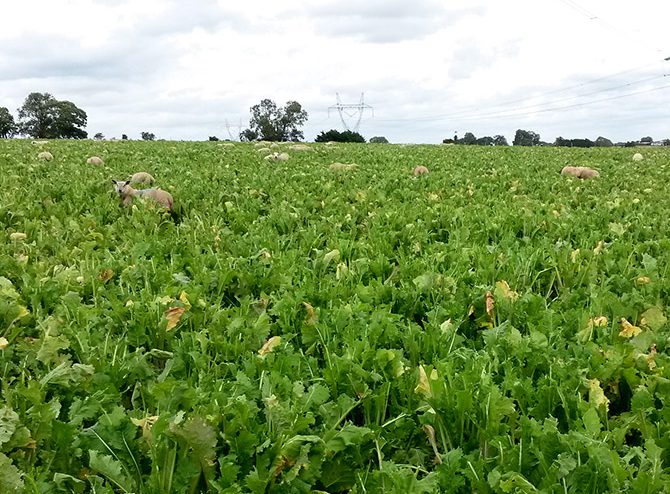
Father and son partnership Ken and Richard Mathews from Killeigh in Co. Offaly have one of the top performing sheep flocks in the country and have the award to prove it.
The Mathews’ ability to delivery excellence in sheep management and production saw them named as the Zurich Farm Insurance / Farming Independent Sheep Farmer of the Year winners in Dublin’s Ballsbridge Hotel on Friday, May 20 last. Now in their third year, the awards are all about recognising and rewarding the very best in Irish farming, and the Mathews clearly tick all the boxes as far as sheep farming is concerned.
“It was great to get the award,” Ken proudly states.
“Our Teagasc adviser David Webster asked us to enter so we submitted the details and never thought any more about it until the night of the awards. We didn’t expect to win, which made the award all the more special.”
Located on the way into the village of Killeigh from the Tullamore side, the Mathews farm consists of 48 hectares of grass, while the remaining 27 hectares are divided between cereal crops and forestry. Technically, the Mathews are tillage and sheep farmers, but there is no doubting what the main enterprise is.
“We’d be known as sheep farmers,” explains Ken, who has received tremendous support from his wife Janice down through the years.
“Sheep farming is our game. Richard looks after the tillage side of things. We supply barley to J Grennan & Sons and buy our feeding rations, fertilizers and seed back from them. But sheep is what we’re all about.”
Last year, the father and son partnership achieved an impressive gross margin of €850/ha, driven largely by the 1.93 lambs reared per ewe. This latter figure includes stock reared by ewe lambs that make up a seventh of the flock.
“We had 350 mature ewes and 55 ewe lambs in 2015. They produced 810 lambs, 750 of which we sold the factory and the remaining 60 we kept as ewe lambs. The average dead weight last year was 21kg and the average sale price was €102. The ewes scanned at 2.4 lambs and the ewe lambs at 1.7 lambs. The average for low land flock ewes is 1.4 lambs, so these are excellent figures.
“Our output for 2016 is along similar lines.”
Ken attributes this massive productivity to the prolificacy of the Belclare crossbreds and a high attention to detail which ensures that mortality levels are kept to just 9 per cent – even with half of the 279 crossbreds and 15 per cent of the 78 Suffolks producing more than two lambs.
“We have one of the most prolific flocks in Ireland. We have two Belclare rams and the rest are mostly Charollais. They are all five-star rams. Last year we had three sets of five (lambs), 30 sets of quads as well as numerous sets of triplets and doubles,” the affable 66-year-old continues.
“It’s crucial to have a low morality rate because the money is made on having those extra lambs. They say that every dead lamb is a loss of about €70 to the farmer. Our ewe losses are exceptionally low also – we only lost three out of 400 this year.”
The majority of the lambs are born in March. This is a particularly hectic month for Ken and Richard who share the lambing duties with agricultural / vet students and other family members.
“One of the things that we rely a lot on here is a whiteboard to communicate with the next person taking over. We try to lamb about 90 per cent of the flock in three weeks, so there’s several shifts. Sometimes we clock off before the next person starts, so that whiteboard in the storeroom is vital to make sure that the next person knows what to prioritise.
“We have been taking ag students for over 25 years and I have to say this year’s student, Brianna Groome, was one of the best we’ve ever had. Brianna, who’s from Rhode, is studying in Gurteen College. She was a natural with the lambs, and made the task of getting them started on our Forster Technik automatic feeding machine when they were three and four days old look easy. We find the feeding machine to be great for rearing lambs as it dramatically reduces the labour hours.”
The Mathews’ secret weapon for putting weight on store lambs is Typhon (a cross between stubble turnip and Chinese cabbage), which they grow along with silage and rape.
“Our big success is Typhon. We put the lambs on that after they’re weaned and it finishes them off well. We sowed 16 acres of it this year. We also feed them on good quality silage and rape, which ties in nicely with our tillage system. We have a good grass management system which is centred around paddock grazing. By the end of the summer, most of the lambs have been sent to the factory which, for us, is Irish Country Meats (ICM) in Camolin.”
Ken is secretary and coordinator of the Offaly Quality Lamb Producer Cooperative which has a membership of 120 producers throughout the midlands who supply 30,000 lambs per annum under contract agreement to ICM. Believed to be the oldest lamb producer group in the country, it has been in existence for more than 40 years and was one of the first such groups to qualify for EEC support in the early 1970s. Ken is joined on the executive by Gordon Kelly (chairperson), John C Joyce (vice-chairperson) and Cormac Kelly (treasurer).
In addition, Ken is a member of the Killeigh branch of the IFA (he’s a former IFA sheep representative for Offaly), ICSA (Irish Cattle and Sheep Farmers’ Association) and is a patron of Macra na Feirme.
Richard and Ken Mathews Partnership
The Abbey,
Killeigh,
Tullamore,
Co. Offaly.
Telephone: 087 2306555
Taken from Irish Tractor & Agri magazine Vol 4 No 8, October 2016
Richard and Ken Mathews Partnership